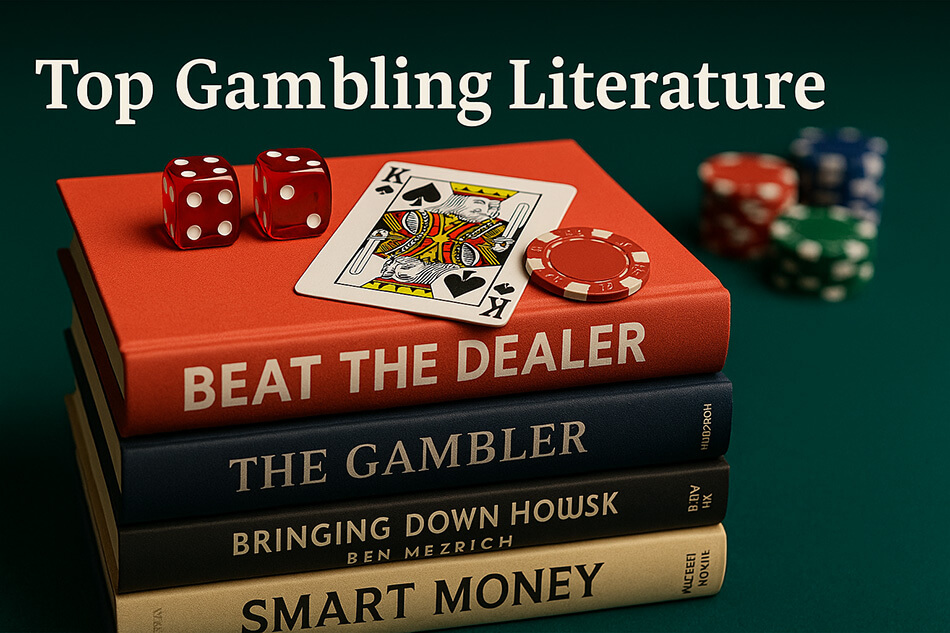
Unveiling the Top 5 Books on Gambling
Published by Sheena Jade on March 3, 2024

Published by Sheena Jade on March 3, 2024
Any gambler worth their salt will say the same thing; research is key to improving your skills. For many, research entails reading more about the game of their choice, and understanding the intricacies therein. However, that isn’t all that research has to be. Sometimes, a lot of knowledge regarding a certain game can be found in books. Thankfully, many of the gamblers and casino researchers that came before have written widely on the subject, and have left us the information we need to improve our own skills.
That being said, there have been plenty of fiction writers who’ve tackled the topic of gambling. Though often, readers don’t put a lot of stock in fiction as an “informative” genre, there is a lot that one can gleam from novels about gambling. That is why, in this text, we are not just going to focus on dry, non-fiction books about casino strategies. We are also going to discuss some excellent novels that could give you an idea of what casinos are like.
📚 Top Gambling Literature: Must-Read Books for Every Gambler

📖 What is Gambling Literature?
Under the umbrella of gambling literature, we could include any book that tackles the topic of casinos, gambling strategies, or the psychology of gamblers. However, our goal here is not to overwhelm newcomers with a reading list. Rather, the purpose of gambling literature should be to steer new, and experienced fans in the right direction. That is why, we are not just focusing on informative books, but interesting ones as well. In other words, the text will highlight some of the most important gambling literature, that is also gripping and enticing.
As stated before, we will not be focusing on non-fiction alone. That being said, non-fiction will make up the majority of this list. Not because non-fiction is superior, or inherently more informative. Simply because, there are a lot of excellent, enticing, and thrilling reads of non-fiction that relate to gambling. Without further ado, let us now look into the top five books on gambling, that can help amateurs and veterans improve their game, as well as their relationship to the casino.
🧠 Beat the Dealer by Edward O. Thorp
Edward Oakley Thorp is a legendary name in the world of gambling. Now a famous hedge fund manager, Thorp initially got his fame for his research into blackjack, and whether probability theory could be applicable to gambling. Though most gamblers may not have heard the name “Thorp,” they’ve certainly heard of his legacy. You see, Edward Oakley Thorp is the man who, for all intents and purposes, invented card counting, and popularized it as a common gambling strategy.
Though, to say he invented card counting is likely untrue. Blackjack has been around for centuries, well before Thorp was ever born. It is more accurate to say Thorp managed to prove that card counting is an effective strategy, and can help players overcome the odds when playing the game. Outside of blackjack, Thorp is responsible for developing several hedge fund management techniques, and contributed to the creation of the first wearable computer. But, what we are interested in is his work Beat the Dealer.
Beat the Dealer: A Winning Strategy for the Game of Twenty-One is one of the most influential and important books on blackjack. If you are playing blackjack in live casinos online, or in land-based establishments, reading Beat the Dealer is almost a must. In its pages, Thorp goes over the effectiveness of card counting, and how using the simple strategy can help any gambler overcome the house edge, and, as the book promises, “beat the dealer.” The best part about it is that the book is simple to read, and thoroughly explains how card counting works, so that anyone can make use of the strategy.
In 2025, many have criticized the book as outdated. After all, casinos the world over have changed their rules to prohibit card counting, specifically based on Beat the Dealer. However, there is a reason why the non-fiction tome remains a must-read for any professional player. While we wouldn’t recommend treating it as an infallible piece of literature, we’d certainly encourage any gambler to read this great work.
🎲 The Gambler by Fyodor Dostoevsky
As we said, in this article, we won’t be focusing solely on the non-fiction side. Fiction can teach us a lot about the human experience and condition. Perhaps no other writer throughout history has managed to capture the cynical and the dark side of the human spirit as accurately as Fyodor Dostoevsky. The Russian novelist wrote dark, existentialist works, but always with a strong moral message behind them. Such a novel is his 1866 short, pseudo-biographical novel, The Gambler.
The first reason we are recommending The Gambler has to do with its length. Coming in at less than 200 pages, most readers will be able to complete the work in under a week. Particularly fast readers will only take a day or so to finish it. The other reason for why we are recommending this work, is because it delves deep into the psychology of a man who becomes enamored by roulette. Here, Dostoevsky injects a bit of himself in the work, as he too was a great fan of the red and black wheel.
The novel focuses on a tutor, who comes under the employ of a Russian military officer. The young man lives in a German hotel, and one day finds himself attracted to the casino floor, where he comes upon roulette. Even today, many gambling fans argue about the various roulette guides online, and debate whether the game requires luck or strategy to win. Believe it or not, during Dostoevsky’s time, that debate was quite prominent as well.
As the book goes, the protagonist finds himself at the roulette table much more frequently. He notices that he has less money to spend, and he also finds that when he isn’t playing roulette, he is thinking about playing roulette. In other words, the book is not just about the alluring power of the casino, but also about the human psyche’s vulnerability. A powerful statement about responsible gambling and combatting addiction, we recommend that everyone who is new to gambling give this book a read, and learn how to avoid the mistakes that the protagonist makes.
♠️ Bringing Down the House by Ben Mezrich
From the late 1970s to the early 2000s, a group of MIT students and alumni got together and devised a, seemingly, unbeatable strategy. The idea was to take on casinos throughout the country, and “bring down the house.” After the group’s work became known, they came to be known as the MIT Blackjack Team. Their accomplishments have become the stuff of legend in modern pop culture, and their experiences have been immortalized in a book by one of the team’s members.
Bringing Down the House: The Inside Story of Six MIT Students Who Took Vegas for Millions is a New York Times best-selling book, written by Ben Mezrich, a member of the actual team, who joined after the team had been established. In his book, Mezrich details the different ways in which the blackjack team managed to outwit casinos throughout the United States. The book has had major success, and was even adapted into a film, titled simply “21.”
Though, Bringing Down the House is considered and marketed as a “non-fiction” book, a lot of controversy has arisen surrounding it. Participants in the MIT Blackjack Operation have complained about their depiction, and many have pointed out historical inaccuracies. However, as we said, the delineation between fiction and non-fiction is irrelevant to this article. That being said, we would recommend reading this book with a grain of salt, and a healthy dose of skepticism.
💰 Smart Money by Michael Konik
Michael Konik is a multi-talented guy. He has written several books, appeared on various TV programs, performed some hilarious stand-up comedy, and has even participated in several blackjack and poker tournaments. Needless to say, he knows a thing or two about gambling. However, with his 2006 work, The Smart Money, he proved that he also has an expert familiarity with sports betting.
Often, non-fiction has an unfairly earned reputation as being stuffy, unengaging, and quite frankly boring. Michael Konik proves that reading about real people and events can be just as thrilling as reading the latest work of fantasy, science fiction, or crime. Yet, by being entertaining, he never once sacrifices being informative. The Smart Money is an excellent work for those interested in the secretive world of professional sports gambling.
The book is framed as an interview with Rick “Big Daddy” Matthews, a prolific sports gambler, and leader of “The Brain Trust.” In dealing with Matthews, Konik came to realize that behind the charm and charisma, was a truly brilliant, yet conniving man who would do anything to get ahead in life. We would recommend the book, not just to those interested in sports gambling, but also those who just want a wild thrill ride, and a look into one of the America’s shadiest industries.
📊 The Logic of Sports Betting by Ed Miller
For this final entry, we are looking at a book by Ed Miller, a contemporary writer and gambler, who has published several works on poker. Playing Poker, Poker’s 1%, How to Read Hands at No-Limit Hold ’em and Getting Started in Hold ‘em, are all works that every poker hopeful should read, at least once. They are perfect, entry-level works, especially for those who are getting tired of video poker games online, and want to move on to the real thing.
However, in 2019, Ed Miller took a step away from poker, and decided to tackle the world of sports betting. However, unlike Michael Konik’s work, The Logic of Sports Betting is not some grand exploration of a secret betting cabal. Rather, it is an excellent guide for people who want to learn a thing or two about sports gambling. If you read this book, you will learn how sportsbooks operate, and the logic behind betting on some of the most popular sports.
That being said, Ed Miller’s work does share something in common with Konik’s; it is quite funny. Miller’s humor elevates The Logic of Sports Betting from a stuffy and schoolwork-esque guide to sports betting, to an incredibly readable and fresh experience. Those who might be interested in the dark side of sports betting will certainly have a better time with Smart Money. But, for those who are interested in wagering on their favorite teams, The Logic of Sports Betting is certainly the best bet.
🏁 Conclusion








